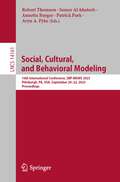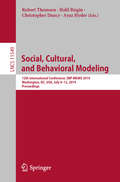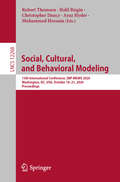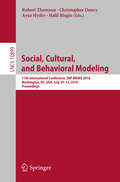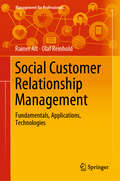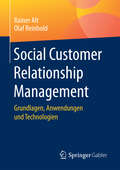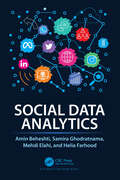- Table View
- List View
Social Computing and Social Media. Technologies and Analytics: 10th International Conference, SCSM 2018, Held as Part of HCI International 2018, Las Vegas, NV, USA, July 15-20, 2018, Proceedings, Part II (Lecture Notes in Computer Science #10914)
by Gabriele MeiselwitzThe two volumes set LNCS 10913-10914 of SCSM 2018 constitutes the proceedings of the 10th International Conference on Social Computing and Social Media, SCSM 2018, held as part of the International Conference on Human-Computer Interaction, HCII 2018, held in Las Vegas, NV, USA, in July 2018. The total of 1171 papers and 160 posters presented at the 14 colocated HCII 2018 conferences. The papers were carefully reviewed and selected from 4346 submissions. These papers which are organized in the following topical sections: social media user experience, individual and social behavior in Social Media, privavcy and ethical issues in Social Media, motivation and gamification in Social Media, social network analysis, and agents, models and algorithms in Social Media.
Social Computing and Social Media. User Experience and Behavior: 10th International Conference, SCSM 2018, Held as Part of HCI International 2018, Las Vegas, NV, USA, July 15-20, 2018, Proceedings, Part I (Lecture Notes in Computer Science #10913)
by Gabriele MeiselwitzThe two volumes set LNCS 10913-10914 of SCSM 2018 constitutes the proceedings of the 10th International Conference on Social Computing and Social Media, SCSM 2018, held as part of the International Conference on Human-Computer Interaction, HCII 2018, held in Las Vegas, NV, USA, in July 2018. The total of 1171 papers and 160 posters presented at the 14 colocated HCII 2018 conferences. The papers were carefully reviewed and selected from 4346 submissions. These papers which are organized in the following topical sections: social media user experience, individual and social behavior in Social Media, privavcy and ethical issues in Social Media, motivation and gamification in Social Media, social network analysis, and agents, models and algorithms in Social Media.
Social Computing, Behavioral-Cultural Modeling, and Prediction: 8th International Conference, SBP 2015, Washington, DC, USA, March 31-April 3, 2015. Proceedings (Lecture Notes in Computer Science #9021)
by Nitin Agarwal Kevin Xu Nathaniel OsgoodThis book constitutes the refereed proceedings of the 8th International Conference on Social Computing, Behavioral-Cultural Modeling, and Prediction, SBP 2015, held in Washington, DC, USA, in March/April 2015. The 24 full papers presented together with 36 poster papers were carefully reviewed and selected from 118 submissions. The goal of the conference was to advance our understanding of human behavior through the development and application of mathematical, computational, statistical, simulation, predictive and other models that provide fundamental insights into factors contributing to human socio-cultural dynamics. The topical areas addressed by the papers are social and behavioral sciences, health sciences, engineering, computer and information science.
Social Computing, Behavioral-Cultural Modeling and Prediction: 6th International Conference, SBP 2013, Washington, DC, USA, April 2-5, 2013, Proceedings (Lecture Notes in Computer Science #7812)
by Ariel M. Greenberg William G. Kennedy Nathan D. BosThis book constitutes the proceedings of the 6th International Conference on Social Computing, Behavioral-Cultural Modeling and Prediction, SBP 2013, held in Washington, DC, USA in April 2013. The total of 57 contributions, which consists of papers and posters, included in this volume was carefully reviewed and selected from 137 submissions. This conference is strongly committed to multidisciplinarity, consistent with recent trends in computational social science and related fields. The topics covered are: behavioral science, health sciences, military science and information science. There are also many papers that provide methodological innovation as well as new domain-specific findings.
Social Computing, Behavioral-Cultural Modeling and Prediction: 7th International Conference, SBP 2014, Washington, DC, USA, April 1-4, 2014. Proceedings (Lecture Notes in Computer Science #8393)
by William G. Kennedy Nitin Agarwal Shanchieh Jay YangThis book constitutes the refereed proceedings of the 7th International Conference on Social Computing, Behavioral-Cultural Modeling, and Prediction, SBP 2014, held in Washington, DC, USA, in April 2014. The 51 full papers presented were carefully reviewed and selected from 101 submissions. The SBP conference provides a forum for researchers and practitioners from academia, industry, and government agencies to exchange ideas on current challenges in social computing, behavioral-cultural modeling and prediction, and on state-of-the-art methods and best practices being adopted to tackle these challenges. The topical areas addressed by the papers are social and behavioral sciences, health sciences, military science, and information science.
Social Computing, Behavioral-Cultural Modeling and Prediction: 4th International Conference, SBP 2011, College Park, MD, USA, March 29-31, 2011. Proceedings (Lecture Notes in Computer Science #6589)
by John Salerno Shanchieh Jay Yang Dana Nau Sun-Ki ChaiThis book constitutes the refereed proceedings of the 4th International Conference on Social Computing, Behavioral-Cultural Modeling and Prediction, held in College Park, MD, USA, March 29-31, 2011. The 48 papers and 3 keynotes presented in this volume were carefully reviewed and selected from 88 submissions. The papers cover a wide range of topics including social network analysis; modeling; machine learning and data mining; social behaviors; public health; cultural aspects; and effects and search.
Social Computing, Behavioral-Cultural Modeling and Prediction: 5th International Conference, SBP 2012, College Park, MD, USA, April 3-5, 2012, Proceedings (Lecture Notes in Computer Science #7227)
by Shanchieh Jay Yang Ariel M. Greenberg Mica EndsleyThis book constitutes the refereed proceedings of the 5th International Conference on Social Computing, Behavioral-Cultural Modeling and Prediction, held in College Park, MD, USA, in April 2012. The 43 revised papers presented in this volume were carefully reviewed and selected from 76 submissions. The papers cover a wide range of topics including economics, public health, and terrorist activities, as well as utilize a broad variety of methodologies, e.g., machine learning, cultural modeling and cognitive modeling.
Social Computing, Behavioral Modeling, and Prediction
by Huan Liu Michael J. Young John SalernoSocial computing concerns the study of social behavior and context based on computational systems. Behavioral modeling reproduces the social behavior, and allows for experimenting with and deep understanding of behavior, patterns, and potential outcomes. The pervasive use of computer and Internet technologies provides an unprecedented environment where people can share opinions and experiences, offer suggestions and advice, debate, and even conduct experiments. Social computing facilitates behavioral modeling in model building, analysis, pattern mining, anticipation, and prediction. The proceedings from this interdisciplinary workshop provide a platform for researchers, practitioners, and graduate students from sociology, behavioral and computer science, psychology, cultural study, information systems, and operations research to share results and develop new concepts and methodologies aimed at advancing and deepening our understanding of social and behavioral computing to aid critical decision making.
Social Computing in Digital Education: First International Workshop, SOCIALEDU 2015, Stanford, CA, USA, August 19, 2015, Revised Selected Papers (Communications in Computer and Information Science #606)
by Fernando Koch Andrew Koster Tiago PrimoThis book constitutes the refereed proceedings of the First International Workshop, SOCIALEDU 2015, held in Stanford, CA, USA, in August 2015. The workshop aimed to discuss computational models of social computing applied to Digital Education. The 9 revised full papers presented were carefully reviewed and selected from 12 submissions. The papers address issues such as novel data mining and machine learning for social intelligence in digital education.- Social modelling and simulation to investigate social behaviours, emotional intelligence, influence processes and other social aspects that may influence learning performance in an educational environment.- Smart environments and interactive systems of social computing in digital education.- Analysis of social media and media intelligence in digital education.- Mobile social gaming in digital education.- The utilization of mobile and wearable technology in social systems in digital education, and others.
Social Computing with Artificial Intelligence
by Xun LiangThis book provides a comprehensive introduction to the application of artificial intelligence in social computing, from fundamental data processing to advanced social network computing. To broaden readers’ understanding of the topics addressed, it includes extensive data and a large number of charts and references, covering theories, techniques and applications. It particularly focuses on data collection, data mining, artificial intelligence algorithms in social computing, and several key applications of social computing application, and also discusses network propagation mechanisms and dynamic analysis, which provide useful insights into how information is disseminated in online social networks. This book is intended for readers with a basic knowledge of advanced mathematics and computer science.
Social Coordination Frameworks for Social Technical Systems (Law, Governance and Technology Series #30)
by Huib Aldewereld Olivier Boissier Virginia Dignum Pablo Noriega Julian PadgetThis book addresses the question of how to achieve social coordination in Socio-Cognitive Technical Systems (SCTS). SCTS are a class of Socio-Technical Systems that are complex, open, systems where several humans and digital entities interact in order to achieve some collective endeavour. The book approaches the question from the conceptual background of regulated open multiagent systems, with the question being motivated by their design and construction requirements. The book captures the collective effort of eight groups from leading research centres and universities, each of which has developed a conceptual framework for the design of regulated multiagent systems and most have also developed technological artefacts that support the processes from specification to implementation of that type of systems. The first, introductory part of the book describes the challenge of developing frameworks for SCTS and articulates the premises and the main concepts involved in those frameworks. The second part discusses the eight frameworks and contrasts their main components. The final part maps the new field by discussing the types of activities in which SCTS are likely to be used, the features that such uses will exhibit, and the challenges that will drive the evolution of this field.
Social, Cultural, and Behavioral Modeling: 10th International Conference, SBP-BRiMS 2017, Washington, DC, USA, July 5-8, 2017, Proceedings (Lecture Notes in Computer Science #10354)
by Dongwon Lee, Yu-Ru Lin, Nathaniel Osgood and Robert ThomsonThis book constitutes the refereed proceedings of the 10th International Conference on Social, Cultural, and Behavioral Modeling & Prediction and Behavior Representation in Modeling and Simulation, SBP-BRiMS 2017, held in Washington, DC, USA, in July 2017.The 16 full papers and 27 short papers presented were carefully reviewed and selected from 79 submissions. Owing to its strong multi-disciplinary heritage, the papers represent a large range of disciplines including computer science, psychology, sociology, communication science, public health, bioinformatics, political science, and organizational science and use numerous types of computational methods such as machine learning, language technology, social network analysis and visualization, agent-based simulation, and statistics. They are organized in the following topical sections: behavioral and social sciences; cyber and intelligence applications; information, systems, and network sciences; and methodology.
Social, Cultural, and Behavioral Modeling: 9th International Conference, SBP-BRiMS 2016, Washington, DC, USA, June 28 - July 1, 2016, Proceedings (Lecture Notes in Computer Science #9708)
by Kevin S. Xu, David Reitter, Dongwon Lee and Nathaniel OsgoodThis book constitutes the refereed proceedings of the 9th International Conference on Social, Cultural, and Behavioral Modeling & Prediction and Behavior Representation in Modeling and Simulation, SBP-BRiMS 2016, held in Washington, DC, USA, in June/July 2016. The 38 full papers presented were carefully reviewed and selected from 78 submissions. The goal of this conference was to build a new community of social cyber scholars by bringing together and fostering interaction between members of the scientific, corporate, government and military communities interested in understanding, forecasting and impacting human socio-cultural behavior. For this three challenges have to be met: deep understanding, socio-cognitive reasoning, and re-usable computational technology. Thus papers come from a wide number of disciplines: computer science, psychology, sociology, communication science, public health, bioinformatics, political science, and organizational science.
Social, Cultural, and Behavioral Modeling: 16th International Conference, SBP-BRiMS 2023, Pittsburgh, PA, USA, September 20–22, 2023, Proceedings (Lecture Notes in Computer Science #14161)
by Robert Thomson Samer Al-Khateeb Annetta Burger Patrick Park Aryn A. PykeThis book constitutes the proceedings of the 16th International Conference on Social, Cultural, and Behavioral Modeling, SBP-BRiMS 2023, which was held in Pittsburgh, PA, USA in September 2023.The 31 full papers presented in this volume were carefully reviewed and selected from 73 submissions. The papers were organized in topical sections as follows: Detecting malign influence; human behavior modeling; and social-cyber behavior modeling.
Social, Cultural, and Behavioral Modeling: 12th International Conference, SBP-BRiMS 2019, Washington, DC, USA, July 9–12, 2019, Proceedings (Lecture Notes in Computer Science #11549)
by Robert Thomson Halil Bisgin Christopher Dancy Ayaz HyderThis book constitutes the proceedings of the 12th International Conference on Social, Cultural, and Behavioral Modeling, SBP-BRiMS 2019, held in Washington, DC, USA, in July 2019. The total of 28 papers presented in this volume was carefully reviewed and selected from 72 submissions. The papers in this volume show, people, theories, methods and data from a wide number of disciplines including computer science, psychology, sociology, communication science, public health, bioinformatics, political science, and organizational science. Numerous types of computational methods are used include, but not limited to, machine learning, language technology, social network analysis and visualization, agent-based simulation, and statistics.
Social, Cultural, and Behavioral Modeling: 13th International Conference, SBP-BRiMS 2020, Washington, DC, USA, October 18–21, 2020, Proceedings (Lecture Notes in Computer Science #12268)
by Robert Thomson Halil Bisgin Christopher Dancy Ayaz Hyder Muhammad HussainThis book constitutes the proceedings of the 13th International Conference on Social, Cultural, and Behavioral Modeling, SBP-BRiMS 2020, which was planned to take place in Washington, DC, USA. Due to the COVID-19 pandemic the conference was held online during October 18–21, 2020. The 33 full papers presented in this volume were carefully reviewed and selected from 66 submissions. A wide number of disciplines are represented including computer science, psychology, sociology, communication science, public health, bioinformatics, political science, and organizational science. Numerous types of computational methods are used, such as machine learning, language technology, social network analysis and visualization, agent-based simulation, and statistics.
Social, Cultural, and Behavioral Modeling: 11th International Conference, SBP-BRiMS 2018, Washington, DC, USA, July 10-13, 2018, Proceedings (Lecture Notes in Computer Science #10899)
by Robert Thomson Christopher Dancy Ayaz Hyder Halil BisginThis book constitutes the proceedings of the 11th International Conference on Social, Cultural, and Behavioral Modeling, SBP-BRiMS 2018, held in Washington, DC, USA, in July 2018. The total of 27 short and 18 full papers presented in this volume was carefully reviewed and selected from 85 submissions. The contributions were organized in topical sections named: advances in sociocultural and behavioral process modeling; information, systems, and network science; applications for health and well-being; military and intelligence applications; cybersecurity.
Social, Cultural, and Behavioral Modeling: 15th International Conference, SBP-BRiMS 2022, Pittsburgh, PA, USA, September 20–23, 2022, Proceedings (Lecture Notes in Computer Science #13558)
by Robert Thomson Christopher Dancy Aryn PykeThis book constitutes the proceedings of the 15th International Conference on Social, Cultural, and Behavioral Modeling, SBP-BRiMS 2022, which was in Pittsburgh, PA, USA in September 2022.The 25 full papers presented in this volume were carefully reviewed and selected from 50 submissions. The papers were organized in topical sections as follows: computer science, psychology, sociology, communication science, public health, bioinformatics, political science, and organizational science. Numerous types of computational methods are used include, but not limited to, machine learning, language technology, social network analysis and visualization, agent-based simulation, and statistics.
Social, Cultural, and Behavioral Modeling: 14th International Conference, SBP-BRiMS 2021, Virtual Event, July 6–9, 2021, Proceedings (Lecture Notes in Computer Science #12720)
by Robert Thomson Muhammad Nihal Hussain Christopher Dancy Aryn PykeThis book constitutes the proceedings of the 14th International Conference on Social, Cultural, and Behavioral Modeling, SBP-BRiMS 2021, which was held online during July 6–9, 2021.The 32 full papers presented in this volume were carefully reviewed and selected from 56 submissions. The papers were organized in topical sections as follows: COVID-related focus; methodologies; social cybersecurity and social networks; and human and agent modeling. They represent a wide number of disciplines including computer science, psychology, sociology, communication science, public health, bioinformatics, political science, and organizational science. Numerous types of computational methods are used including, but not limited to, machine learning, language technology, social network analysis and visualization, agent-based simulation, and statistics.
Social, Cultural, and Behavioral Modeling: 17th International Conference, SBP-BRiMS 2024, Pittsburgh, PA, USA, September 18–20, 2024, Proceedings (Lecture Notes in Computer Science #14972)
by Robert Thomson Scott Renshaw Aryn Pyke Samer Al-Khateeb Annetta Burger Patrick Park Aravind HariharanThis book constitutes the proceedings of the 17th International Conference on Social, Cultural, and Behavioral Modeling, SBP-BRiMS 2024, which was held in Pittsburgh, PA, USA, during September 18–20, 2024. The 24 full papers presented in this volume were carefully reviewed and selected from 54 submissions. They are grouped into the following topics: advancements in tools and theory; data-driven approaches.
Social Customer Relationship Management: Fundamentals, Applications, Technologies (Management for Professionals)
by Rainer Alt Olaf ReinholdSocial media has received considerable attention, and many potential benefits, as well as concerns, are now being discussed. This book explores how social media can successfully support business processes in marketing, sales and service in the context of customer relationship management (CRM). It presents the fundamentals of Social CRM and shows how small and large companies alike have implemented it.In turn, the book presents analytic and operational software tools that offer features for enhancing and streamlining interactions with customers. The book concludes with an overview of essential design areas that businesses need to bear in mind when introducing social media into their CRM strategies. In this regard, it also points out key success factors, limitations, and data protection aspects.
Social Customer Relationship Management: Grundlagen, Anwendungen und Technologien
by Rainer Alt Olaf ReinholdDieses Buch zeigt wie die Verbindung von Social Media mit Customer Relationship Management (CRM) Perspektiven für Marketing, Verkauf und Service schafft. Es kombiniert dazu Grundlagenwissen und Fallbeispiele. Für das Social CRM identifizieren die Autoren vier Verwendungszwecke sowie drei Umsetzungsstufen und thematisieren auch Fragen der Datenerschließung und der Datenqualität. Es richtet sich sowohl an Praktiker als auch an Lehrende und Studierende.
Social Data Analytics
by Amin Beheshti Samira Ghodratnama Mehdi Elahi Helia FarhoodThis book is an introduction to social data analytics along with its challenges and opportunities in the age of Big Data and Artificial Intelligence. It focuses primarily on concepts, techniques and methods for organizing, curating, processing, analyzing, and visualizing big social data: from text to image and video analytics. It provides novel techniques in storytelling with social data to facilitate the knowledge and fact discovery. The book covers a large body of knowledge that will help practitioners and researchers in understanding the underlying concepts, problems, methods, tools and techniques involved in modern social data analytics. It also provides real-world applications of social data analytics, including: Sales and Marketing, Influence Maximization, Situational Awareness, customer success and Segmentation, and performance analysis of the industry. It provides a deep knowledge in social data analytics by comprehensively classifying the current state of research, by describing in-depth techniques and methods, and by highlighting future research directions. Lecturers will find a wealth of material to choose from for a variety of courses, ranging from undergraduate courses in data science to graduate courses in data analytics.
Social Data Analytics
by Amin Beheshti Samira Ghodratnama Mehdi Elahi Helia FarhoodThis book is an introduction to social data analytics along with its challenges and opportunities in the age of Big Data and Artificial Intelligence. It focuses primarily on concepts, techniques and methods for organizing, curating, processing, analyzing, and visualizing big social data: from text to image and video analytics. It provides novel techniques in storytelling with social data to facilitate the knowledge and fact discovery. The book covers a large body of knowledge that will help practitioners and researchers in understanding the underlying concepts, problems, methods, tools and techniques involved in modern social data analytics. It also provides real-world applications of social data analytics, including: Sales and Marketing, Influence Maximization, Situational Awareness, customer success and Segmentation, and performance analysis of the industry. It provides a deep knowledge in social data analytics by comprehensively classifying the current state of research, by describing in-depth techniques and methods, and by highlighting future research directions. Lecturers will find a wealth of material to choose from for a variety of courses, ranging from undergraduate courses in data science to graduate courses in data analytics.
Social Data Analytics: Collaboration for the Enterprise (The Morgan Kaufmann Series on Business Intelligence)
by Krish Krishnan Shawn P. RogersSocial Data Analytics is the first practical guide for professionals who want to employ social data for analytics and business intelligence (BI). This book provides a comprehensive overview of the technologies and platforms and shows you how to access and analyze the data. You'll explore the five major types of social data and learn from cases and platform examples to help you make the most of sentiment, behavioral, social graph, location, and rich media data. A four-step approach to the social BI process will help you access, evaluate, collaborate, and share social data with ease. You'll learn everything you need to know to monitor social media and get an overview of the leading vendors in a crowded space of BI applications. By the end of this book, you will be well prepared for your organization’s next social data analytics project.Provides foundational understanding of new and emerging technologies—social data, collaboration, big data, advanced analyticsIncludes case studies and practical examples of success and failuresWill prepare you to lead projects and advance initiatives that will benefit you and your organization













